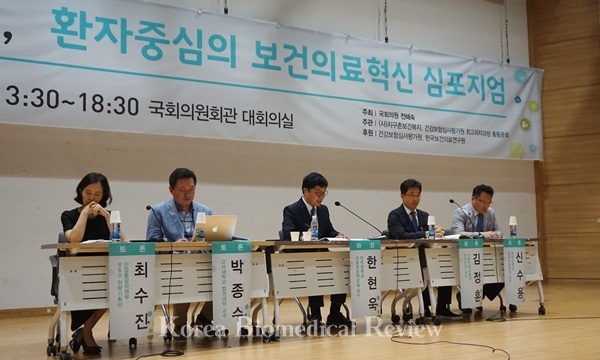There are brisk moves to make better use of big data and develop artificial intelligence (AI) in healthcare area with the advent of the fourth industrial revolution. Hindering these activities are personal information protection rules and regulations that restrict the use of big data, experts point out.
These experts call for the government to lay the foundation for business enterprises and medical institutions to make the most of the big data and other information. They, however, urged bureaucrats not to try to take the lead in these projects but limit their role to improving regulations and disclosing more data.
These and other various opinions were brought up on the issue of “innovation for patient-oriented healthcare,” during a symposium organized by Rep. Jeon Hye-sook전혜숙 of the ruling Democratic Party Thursday.
In the conference, researchers made presentations on various topics such as biodata platform strategy based on integration, and convergence of healthcare field. Drawing particular attention were developing new drugs based on big data, smart cancer examination, Clinical Data Warehouse (CDW), and Consumer Health Informatics (CHI).
However, speakers pointed out that the legal limit of personal information protection is still hindering the invigoration of related projects.

“Doctors want to provide personalized medical treatment using big data, but can’t do so because they can’t use information,” said Professor Park Jong-soo 박종수 at Korea University’s Law School. “So far, doctors have been able to make accomplishments using big data under consents from patients in advance, but how can they get the most out of information under the yoke of privacy protection law?”,
“The government has made the de-identification guideline of personal information, but it is still in controversy within the industry,” he said. “The term de-identification itself doesn’t exist in the privacy protection law, and even though companies use de-identified data based on the guideline, if it is against the law, a legal problem can occur.”
Other experts said the government has to deregulate more actively to reinvigorate the industry.
“The healthcare industry is a typical industry the government regulates. The major role of the government should be to ease regulations,” said Professor Shin Soo-yong신수용 of Kyung Hee University. “We should avoid resorting to government-oriented projects, however. The top-down method isn’t desirable, and the government has only to make companies learn new things through new projects. All it needs to do is to have Health Insurance Review & Assessment Service (HIRA)건강보험심사평가원 and National Health Insurance Service (NHIS)국민건강보험공단 open up their data.”
A government official agreed. “The government has to provide a platform to develop hospitals and the industry,” said Choi Soo-jin최수진, who is working at R&D strategy and planning division of the Ministry of Trade, Industry, and Energy (MOTIE)산업통상자원부. “Domestic drugmakers are experiencing difficulties developing new drugs because of restrictions on their use of big data. The government has to play a leading role in helping startups by, for instance, connecting costs to information as foreign governments do.”
Others said the government has to find the blind spots of big data to provide benefits to various patients and the public.
“It 's hard to use big data if the government doesn’t give a clear guideline,” said Professor Kim Jung-hoon김정훈 of Seoul National University Hospital서울대병원. “Currently, doctors use big data for diseases inflicting a significant number of patients, such as cancers, diabetics, and hypertension or severe and rare diseases, but there is a limit to the research of congenital diseases in children.”
“I asked the Ministry of Health and Welfare (MOHW)보건복지부 to collect data based on the consensus of doctors in the related area. The ministry said it agreed theoretically but cannot help us because it is different from government policy,” he said. “It may be important to maintain proper regulatory controls on big data era, but some patients do not benefit from big data. The government needs to implement policies taking such people into consideration.”

